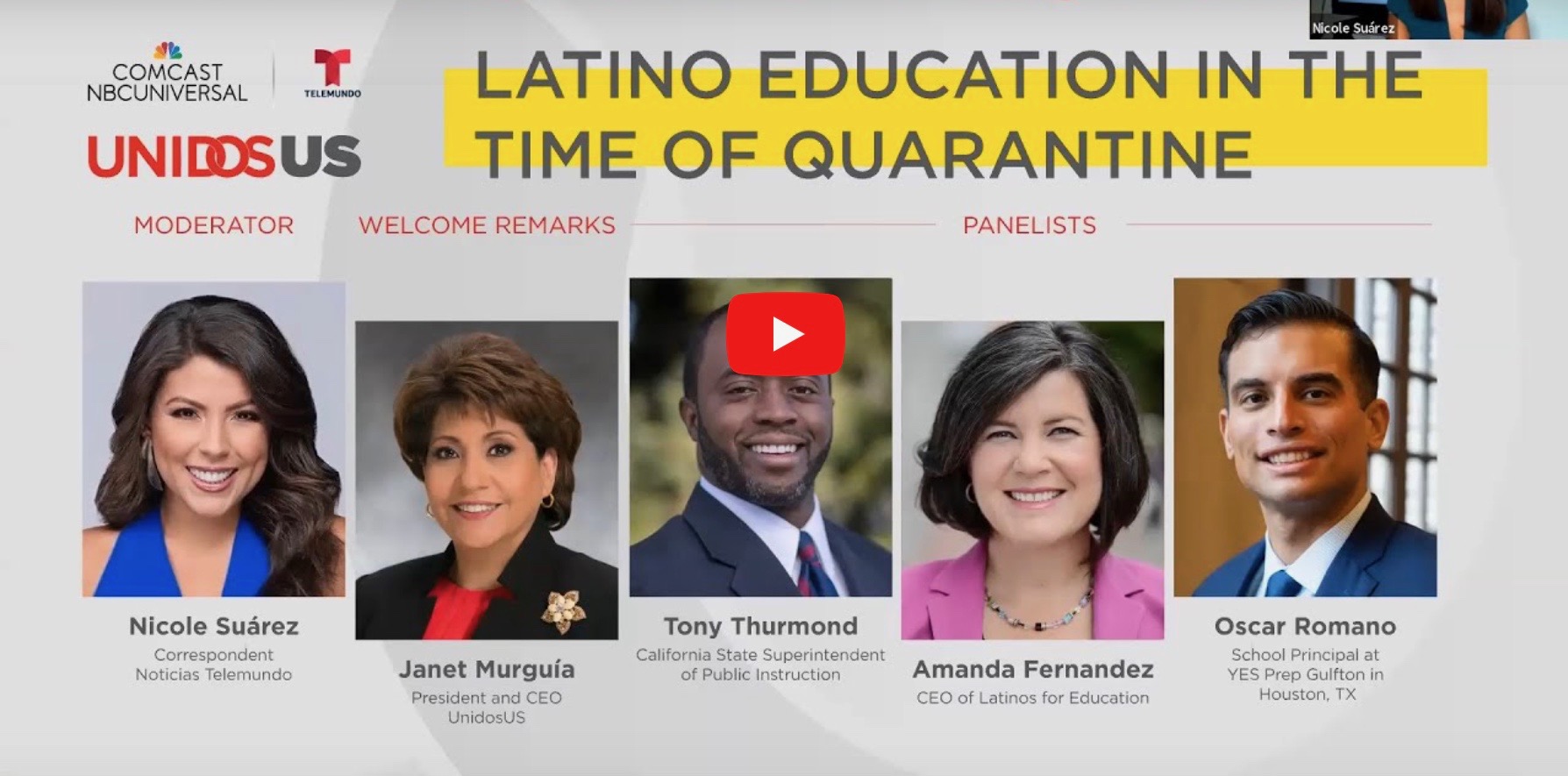VIDEO: UnidosUS Virtual Town Hall Addresses Latino Education in a Time of Quarantine
This year, the COVID-19 pandemic shut the doors on 124,000 U.S. schools, and left teachers and families scrambling to help some 55 million K-12 students get the homework packages, technological devices, and internet access they need to study remotely. And while everyone from school districts to technology companies jumped into high gear to make it happen, the challenges of ensuring all students have the right access and support are so big they’re exacerbating a legacy of structural racism that has left many students of color and English learners (ELs) falling behind. These were some of the takeaways of an UnidosUS Virtual Town Hall on education co-sponsored by UnidosUS and Telemundo.
“When one in four students in this country are Latino or Latinx, the impact of school closures on this country and our community is real and enormous,” UnidosUS President and CEO Janet Murguía said during opening remarks for the event Latino Education in the Time of Quarantine. “We’ve not seen such a disruption to the education system in our lifetime.”
The panel, moderated by Noticias Telemundo Correspondent Nicole Suarez, featured leaders in education trying to address this crisis in diverse communities across the nation.
“We have to give our kudos to school districts around the country who made this pivot very quickly, so I think it’s incumbent upon us as citizens to give the grace to our schools and our school leaders for making such enormous pivots without any warning, any ability to plan,” said panelist Amanda Fernandez, CEO and co-founder of Latinos for Education and Trustee of Massachusetts Board of Elementary and Secondary Education.
But she and the other panelists agreed that this reality does not dismiss the underlying struggle for educational equity.
“This is not a time for us to back away from equity. This is a time for us to talk about how we accelerate learning,” noted panelist Tony Thurmond, California State Superintendent of Public Instruction. In his state, 56% of the public school students are Latinos and 19% are ELs.
And even when technology is made available, there are still plenty of extra hurdles to implementing and utilizing it, added panelist Oscar Romano, School Principal at YES Prep Gulfton in Houston, Texas.
The son of Salvadoran immigrants, he grew up as an EL in the U.S. public school system, and he constantly helping his parents translate and navigate the logistics of adapting to American life. He noted that in addition to school work, students who are low-income, immigrants, ELs, or all the above may be trying to help their families access a wide array of resources to pay bills and put food on the table.
“We’re trying to ask them to learn new systems as well as teach their parents the new systems that they’re expected to follow through with at school, so whether it’s different software, protocols, who to contact, how to contact them, it’s a lot,” Romano said. “So when I think about the kids, I think about the additional burden that’s placed on them. Then I think about what do our students need to be able to succeed?”
In addition to the pandemic, panelists noted that recent protests for racial justice are educating a broader public about the ways structural racism, corporate interests, and social biases can leave students of color, immigrants, and ELs struggling for the right educational supports and a culturally relevant curriculum, as well as make them vulnerable to discriminatory school discipline practices.
In fact, Fernandez likened the sum of all these historic events to a “perfect storm.”
“When we think about learning loss, let’s look at the opportunity gaps that continue to exist and get serious about addressing racism. Things haven’t been working for a long time. They haven’t been working since before COVID, so it’s time to put some energy, some real focus, and not just on equity but on anti-racism,” she said.
In addition to embedding the Virtual Town Hall video, ProgressReport.co has listed the following UnidosUS suggestions for how concerned members of the public can respond.
Be Counted and Take Action:
- Reach out to your Senators to ensure the HEROES Act passes in the Senate, providing the much-needed relief our community needs.
- If you are not already, register to vote here and participate in this year’s elections.
- You can make your voice heard by filling out the census as well, which you can do online, by phone, or by mail. For more information, visit Hazte Contar from our partners at Telemundo.
- Finally, consider supporting our Esperanza/Hope Fund to provide emergency assistance to our community.
We have also created a central hub on UnidosUS.org for COVID-19 information designed to keep Latinos informed. Visitors can find public health and safety information, lists of resources and services the community can access, and informative materials and graphics free to anyone that needs them. Also available is information on the policy priorities UnidosUS has been advocating for with Congress and policymakers to ensure relief that is more equitable, broad-reaching, and inclusive of Latinos. We would appreciate it if you shared this information with your networks.

